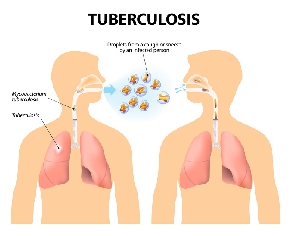 TB infection is spread through droplets from an infected person
TB infection is spread through droplets from an infected person
Dr Yaw Adusi-Poku, Programme Manager for the National TB Control Programme, says Tuberculosis is not hereditary nor a spiritual affliction and that it can affect anyone though curable.
He said research had shown that a lot of Ghanaians had the TB germ within them and might never show signs of the disease because the germ could be inactive within people for years.
Speaking at a press briefing held to mark the World TB Day in Accra on Wednesday, Dr Adusi-Poku said every Ghanaian was at risk of getting infected with Tuberculosis.
“TB infection is spread through droplets from an infected person to an uninfected person, so as long as we continue to live and breathe in a high burdened country such as Ghana we are all at risk,” he said.
The Programme Manager urged persons who were coughing with symptoms such as chest pain, fever and difficulty in breathing to report to a health facility.
The World TB Day is observed on March 24th each year to raise public awareness about the devastating health, social and economic consequences of TB, and to step up efforts to end the global TB epidemic.
Globally, response actions towards the COVID-19 pandemic over the past year has resulted in the diversion of health resources and the workforce away from providing essential services such as the necessary lifesaving diagnosis, medicine and care to people suffering from TB.
Although global attention is now dominated by COVID-19, Tuberculosis remains formidable in Sub-Saharan Africa with Ghana being no exception.
According to the WHO, nearly 4000 lose their lives each year to TB and close to 28,000 people fall ill with this preventable and curable disease.
Dr Adusi-Poku said again people who were coughing should cover their cough with a tissue or cough into their sleeve to reduce the spread of TB.
He said TB case detection in Ghana reduced by 15 per cent from 14,691 in 2019 to 12,443 in 2020.
He attributed this to the COVID 19 pandemic which suppressed OPD attendance, saying, we should remember that the symptoms of the coronavirus such as Cough, Fever, chest pains and difficulty in breathing are similar to TB.
He said preliminary results from a pilot study in the Greater Accra on testing for both Covid 19 and TB at the same time showed that out of 206 samples tested for both Covid and TB from January to March 2021, 19 of them tested positive for TB, whilst four tested positive for Covid.
He said the test and treatment for TB were free and a person suffering from cough, fever and breathlessness could be having either TB, Covid or both diseases hence the need for all to test and know their TB status.
Dr Patrick Kuma-Aboagye, Director of the Ghana Health Service (GHS), in a speech read for him, said Ghana had over the years committed to promoting access to affordable medicines, including generics, and hopes to provide 40 million people access to diagnosis and treatment by 2022.
He said the theme for this year’s World TB day, “The Clock is Ticking “is a reminder to all stakeholders that Ghana was running out of time to act on its commitments to end TB.
This is especially critical in the context of the COVID-19 pandemic where the actions to “End TB” have stalled posing a risk to erode the gains made so far.
The Director General said as a policy, all TB patients were enrolled on the National Health Insurance Scheme (NHIS) for free and received living support to reduce catastrophic cost.
Dr Kuma- Aboagye said the government’s work with health partners had made it possible for patients to get medicines and provided necessary logistics and equipment to manage and treat TB.
He said Ghana had the needed platform to set and achieve TB control targets. “We have a robust well integrated health system with 132 Gene Xpert machines and 55 digital X-rays in the country to test for TB,” he said.
The Director-General appealed to the public to stop stigmatizing persons infected with the TB disease.